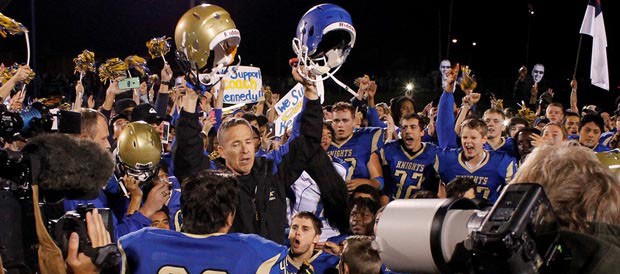In his defense of the U.S. Supreme Court’s 6-3 majority decision supporting a Christian high school football coach’s practice of kneeling in prayer on the postgame 50-yard line, Justice Neil Gorsuch wrote: “Respect for religious expressions is indispensable to life in a free and diverse republic — whether those expressions take place in a sanctuary or on a field, and whether they manifest through the spoken word or a bowed head.”
True enough, but at a school-sponsored sports event, shouldn’t all “religious expressions” be equally respected?
Responding to the court’s decision, this New York Times letter asked: “Want to know the No. 1 issue that I, as a rabbi, have been contacted about by students and families in our South Carolina public schools? Sports. Students who get benched because they don’t join in the Christian team prayer before or after a game. Students who don’t get playing time because they won’t go to the Christian varsity (or some other) pizza lunch offered at school. Students who lose their starting spot on the team because they missed a game (or even a practice) for High Holy Days. And tell me again how exactly we have separation of church and state in this country, and how Monday’s Supreme Court ruling makes us a more perfect union?”
Another Times reader asked: “I wonder if the court’s conservative majority would have ruled for the coach if he were Muslim and his prayers were to Allah?” The letter’s author asked if it is now “time for a test case to determine how religiously tolerant the conservative majority (on the Supreme Court) really is.”
Will the court be as consistent in defending the constitutional rights of non-Christians, even nonbelievers, or is this yet another sign of implicit “re-Christianizing” of the Republic?
Reactions to that ruling and other recent Supreme Court religion-related actions raise an even larger issue: Will the court be as consistent in defending the constitutional rights of non-Christians, even nonbelievers, or is this yet another sign of implicit “re-Christianizing” of the Republic?
In a July 8 New York Times article, “The Far-Right Christian Quest for Power …,” Elizabeth Dias reports a vocal minority of evangelical conservatives now promote politics “that actively prioritizes their particular set of Christian beliefs and far-right views and that more openly embraces Christianity as a bedrock identity.”

Elizabeth Dias
Many eschew the idea of church/state separation, arguing “for a foundational role for their faith in government. Their rise coincides with significant backing among like-minded grass-roots supporters, especially as some voters and politicians blend their Christian faith with election fraud conspiracy theories, QAnon ideology, gun rights and lingering anger over Covid-related restrictions,” Dias says.
She illustrates this endeavor in the rhetoric of Jenna Ellis, former co-counsel for the Trump campaign, who told a recent Patriots Alive gathering, “What it really means to truly be America first, what it truly means to pursue happiness, what it truly means to be a Christian nation are all actually the same thing.”
Dias also cites Kandiss Taylor, a Republican candidate for Georgia governor defeated in the 2022 primary, who, shortly after the court overturned Roe v. Wade, declared: “I’m glad the SCOTUS decided to join me on the FRINGE! Jesus, Guns, & Babies.”
The “prayer decision” prompted yet another Times essay from the blessedly funky and ever insightful Anne Lamott titled, “I Don’t Want to See a Football Coach Praying on the Field.”
It begins: “Many of us who believe in a reality beyond the visible realms, who believe in a soul that survives death, and who are hoping for seats in heaven near the dessert table, also recoil from the image of a high school football coach praying at the 50-yard line. It offends me to see sanctimonious public prayer in any circumstance — but a coach holding his players hostage while an audience watches his piety makes my skin crawl. We are fighting furiously for women’s rights and the planet, and we mean business. We believers march, rally and agitate, putting feet to our prayers. And in our private lives, we pray.”
Then, wonderfully, Lamott moves from the court and the coach to the nature of prayer in her own life, writing: “When I pray for all the places where we see Christ crucified — Ukraine, India, the refugee camps — I see in my heart and in the newspaper that goodness draws near, through UNICEF, Doctors Without Borders, volunteers, through motley old us. …
“I wake up praying. I say a prayer some sober people told me to pray 36 years ago, because when all else fails, follow instructions. It helps me to not fixate on who I am, but on whose. I am God’s adorable, aging, self-centered, spaced-out beloved. … Do I honestly think these kinds of prayers were heard and helpful? Definitely.”

Anne Lamott
As always, reading Anne Lamott got me, another of “God’s adorable, aging, self-centered, spaced-out beloved(s),” thinking: What if the coach’s Washington school district took Justice Gorsuch at his word — “Respect for religious expressions is indispensable to life in a free and diverse republic” — and acted on that admonition?
While the coach is busy praying on the 50-yard line, what if the school encouraged the Buddhist science teacher — I’m speculating here — to pray beneath one goalpost and the Native American tailback to chant a tribal prayer at the other? What if a Jewish Kippah-wearing student prayed at one 20-yard line, and a Hijab-wearing Muslim student prayed at the other?
Think of the possibilities — 100 yards of prayer from devotees of multiple “religious expressions,” each “indispensable to life in a free and diverse republic.”
Think of the possibilities — 100 yards of prayer from devotees of multiple “religious expressions,” each “indispensable to life in a free and diverse republic.” If a 50-yard line prayer is “indispensable” to the coach’s faith, why not open the entire field to the varied “indispensable” faith traditions of players, students and faculty as well? A football game and prayer meeting rolled into one!
I take the coach’s religious commitment seriously. Because of that, the coach, the justice, and the rest of us might revisit a classic gospel adage that I first read in the King James Version: “And when thou prayest, thou shalt not be as the hypocrites are: for they love to pray standing in the synagogues and in the corners of the streets, that they may be seen of men. Verily I say unto you, they have their reward. But thou, when thou prayest, enter into thy closet, and when thou hast shut thy door, pray to thy Father which is in secret; and thy Father which seeth in secret shall reward thee openly” (Matthew 6:4-5).
Those words come straight from the New Testament and, as the old serpent-handling preacher exegeted such passages, “Jesus is the one who’s doing the talking.”
“Go thou and do likewise.” Coach?
Bill Leonard is founding dean and the James and Marilyn Dunn professor of Baptist studies and church history emeritus at Wake Forest University School of Divinity in Winston-Salem, N.C. He is the author or editor of 25 books. A native Texan, he lives in Winston-Salem with his wife, Candyce, and their daughter, Stephanie.

